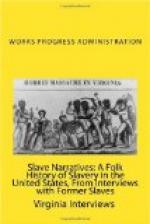“Us kids always used to sing a song, ’Gonna hang Jeff Davis to a sour apple tree as we go marchin’ home.’ I didn’t know what it meant at the time.
“I never knew much about Booker T. Washington, but I heard about him. Frederick Douglass was a great man, too. He did lots of good, like Abe Lincoln.
“Well, slavery’s over and I think that’s a grand thing. A white lady recently asked me, ’Don’t you think you were better off under the white people?’ I said ‘What you talkin’ about? The birds of the air have their freedom’. I don’t know why she should ask me that anyway.
“I belong to the Third Baptist Church. I think all people should be religious. Christ was a missionary. He went about doing good to people. You should be clean, honest, and do everything good for people. I first turn the searchlight on myself. To be a true Christian, you must do as Christ said: ‘Love one another’. You know, that’s why I said I didn’t want to tell about my life and the terrible things that I and my sister Mary suffered. I want to forgive those people. Some people tell me those people are in hell now. But I don’t think that. I believe we should all do good to everybody.”
Betty Lugabell, Reporter [TR: also reported as
Lugabill]
Harold Pugh, Editor
R.S. Drum, Supervisor
Jun 9, 1937
Folklore: Ex-Slaves
Paulding Co., District 10
Mary Belle Dempsey
Ex-Slave, 87 years
“I was only two years old when my family moved here, from Wilford county, Kentucky. ’Course I don’t remember anything of our slave days, but my mother told me all about it.”
“My mother and father were named Sidney Jane and William Booker. I had one brother named George William Booker.”
“The man who owned my father and mother was a good man.” He was good to them and never ’bused them. He had quite a large plantation and owned 26 slaves. Each slave family had a house of their own and the women of each family prepared the meals, in their cabins. These cabins were warm and in good shape.”
“The master farmed his land and the men folks helped in the fields but the women took care of their homes.”
“We had our churches, too. Sometimes the white folks would try to cause trouble when the negroes were holding their meetings, then a night the men of the church would place chunks and matches on the white folks gate post. In the morning the white folks would find them and know that it was a warning if they din’t quit causing trouble their buildings would be burned.”
“There was a farm that joined my parents’ master’s place and the owner was about ready to sell the mother slave with her five small children. The children carried on so much because they were to be separated that the mistress bought them back although she had very little money to spare.”
“I don’t know any more slave stories, but now I am getting old, and I know that I do not have long to live, but I’m not sorry, I am, ready to go. I have lived as the Lord wants us to live and I know that when I die I shall join many of my friends and relatives in the Lord’s place. Religion is the finest thing on earth. It is the one and only thing that matters.”




